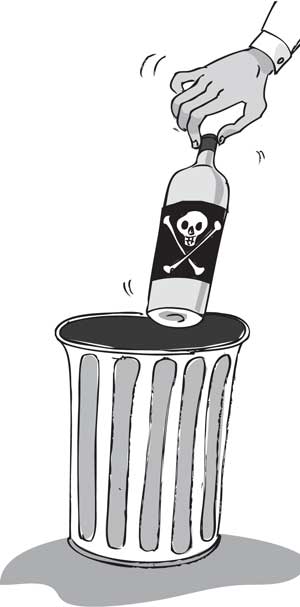No toxic chemicals for green Sri Lanka -
EDITORIAL
One of the important moves for which the National Government is being widely praised is the three-year mission to produce the nutritious food we need in Sri Lanka itself and make Sri Lanka a ‘Wasa Wisa Nethi’ country. An important step in this is the gradual reduction of the use of expensive imported agro-chemicals, some of which are toxic.
Today July 2 marks the 39th anniversary of the 1977 general election where the United National Party (UNP) led by J. R. Jayawardene swept to victory with an unprecedented 5/6th majority. The new government imported and implemented wholesale the globalised, capitalist market economic policies. There were positive aspects of it but one of the main negatives was the large scale import of chemical fertilisers, weedicides and pesticides. For almost 40 years, most of our farmars have been using these agro-chemicals which produce a big harvest but in the long term are polluting or poisoning our Mother Earth and even the ground water resources. One of the disastrous effects is the kidney epidemic which has led to the agonising deaths of thousands of farmers mainly in the North-Central Province.
This year, the National Government decided to stop the provision of imported chemical fertiliser to farmers and instead to give them Rs.25,000 in the hope they would buy or make organic fertiliser from cow dung or other organic material. But some farmers, apparently provoked by political parties which have their own agendas, are insisting they want the subsidised chemical fertiliser. But the government and organic farmers’ movements led by the activist parliamentarian the Ven. Athuraliye Rathana Thera are insisting that Sri Lanka must gradually switch to organic fertiliser to stop the pollution of our soil and the poisoning of the rice, grains, vegetables and fruits that we eat. The government needs to use the media to make the farmers aware of what happened and what is happening. Before the 1970s, the big transnational chemical corporations produced chemical weapons for the major wars including the war in Vietnam.
After the wars ended, these transnational giants produced agro-chemicals and used mainly Third World countries as dumping grounds. Sri Lanka was one of the victims. President Maithripala Sirisena, who is also in charge of environmental affairs, is taking a tough stand on this issue. Earlier this week the President ordered the Registrar of Pesticides and other officials to ban the import, marketing and the use of all varieties of weedicides. The intention is to give the people toxin-free food so that we will become a healthy and therefore wealthy nation.
Despite pressure from transnational companies and their vested interests here, the President had earlier banned the import or sale of the weedicide Glyphosate, which is known to badly affect the health of the people. But the vested interests involved in such operations are wicked and cunning. It has been revealed that to circumvent the Glyphosate ban, the pesticide Glufosinate-ammonium has been imported and marketed under different brand names in several parts of Sri Lanka.We hope the President will maintain a crack down on those who are trying to pollute or poison our country while we have busted up millions of dollars to import their toxic chemicals for about 40 years.
Yesterday much in line with the eco-friendly vision, the President launched a mission to create about 10,000 green villages with village development councils also launching a multitude of other projects to provide productive or creative employment opportunities to tens of thousands of people. We hope these and other projects will lead to the creation of a green Sri Lanka for the common good of all, mainly the generations to come.


